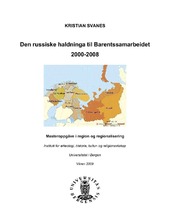| dc.contributor.author | Svanes, Kristian | eng |
| dc.date.accessioned | 2010-02-05T10:59:56Z | |
| dc.date.available | 2010-02-05T10:59:56Z | |
| dc.date.issued | 2009-05-15 | eng |
| dc.date.submitted | 2009-05-15 | eng |
| dc.identifier.uri | https://hdl.handle.net/1956/3782 | |
| dc.description.abstract | The main objective of this Master Thesis was to examine the Russian attitude to the Barents Cooperation from 2000 to 2008. This was accomplished by taking a closer look at the federal and regional Russian attitude, mainly by analysing articles, interviews and speeches published by the Russian MFA, minute books published by the Barents Regional Council and Committee and interviews with informants based in Northwest Russia. I attempted to discover a link between the centralisation of state power during the presidency of Vladimir Putin and the regional Russian attitude towards the Barents Cooperation (BC). The federal authorities expressed a negative experiences with the cooperation progress in the period of 2000-2002, while at the same experiencing weak influence regarding EU's Northern Dimension. From 2003-2008 the federal authorities signalled a more positive attitude towards the BC. I found that the federal authorities focused heavily on the economic part of the BC in the period of 2000-2003, subsequently, however, this approach changed to a broader one between 2004 and 2008. The prominent focus on the economic part was linked to President Putin urging the MFA in 2001 to focus on promoting Russian economic interests and the great gap in living standards between the Russian and Nordic side. The environmental component was also perceived as one of high priority. This can be explained as a strategy for attracting additional finances to the, in addition the economic benefits increased energy efficiency provides. The regional priorities to a large degree corresponded with the federal. Regional Minute books revealed that the regional level of meeting attendance increased substantially during the period, implying that also the regional attitude was more positive in 2008 than in 2003. However, the Russian regions were significantly less active compared to their Nordic counterparts. More cooperation experience, a more effective BC and improved economic conditions in the Russian Federation contributed to the more positive attitude. The thesis thus revealed that the common or general Russian attitude towards the BC evolved in a positive direction during 2000-2008. A link between the state power centralisation and the regional attitude towards BC was not found. However, the centralisation affected the possibilities of the regions to control own finances. | en_US |
| dc.description.abstract | Formålet med oppgåva var å finna ut kva som var den russiske haldninga til Barents-samarbeidet i perioden 2000-2008. Eg har gått gjennom både den føderale og regionale haldninga til samarbeidet. Det var også eit mål å avdekkja om det fanst ein samanheng mellom den russiske regionale haldninga til Barentssamarbeidet og innstramminga av føderale-regionale tilhøve etter tusenårsskiftet. Eg viste at føderale styresmakter hadde ei noko lunken haldning til Barentssamarbeidet i tidsrommet 2000-2002, men at dei var generelt sett positive. Frå og med 2003 var dei derimot gradvis meir positive til Barentssamarbeidet. Kjeldedekninga for den regionale haldninga i perioden 2000-2002 er svak, men samsvarte med det at haldninga utvikla seg i positiv retning frå og med 2003. Når det gjeld prioriteringar var det i perioden 2000-2003 eit sterkt fokus hjå føderale styresmakter på å intensivera den økonomiske delen av Barentssamarbeidet. Frå og med 2004 var det derimot ein tendens til at føderale styresmakter ønskte å prioritera samarbeid også på andre område enn det økonomiske, men det økonomiske framstod likevel som det viktigaste. Fokuset på økonomisk samarbeid viste seg også å vera høgast prioritert hjå regionane, og kan såleis seiast å vera felles for både den føderale og regionale haldninga. Dersom ein skal tala om ei felles russisk haldning til Barentssamarbeidet, var den russiske haldninga til samarbeidet heilt klart meir positiv ved slutten av perioden i år 2008 enn ved tusenårsskiftet. | en_US |
| dc.format.extent | 1062511 bytes | eng |
| dc.format.mimetype | application/pdf | eng |
| dc.language.iso | nno | eng |
| dc.publisher | The University of Bergen | eng |
| dc.subject | Barentssamarbeidet | nob |
| dc.subject | Regionalisering | nob |
| dc.subject | Nordområdene | nob |
| dc.subject | Barentshavet | nob |
| dc.subject | Russland | nob |
| dc.subject | Den russiske føderasjon | nob |
| dc.subject | Barentsregionen | nob |
| dc.title | Den russiske haldninga til Barentssamarbeidet 2000 - 2008 | eng |
| dc.type | Master thesis | |
| dc.rights.holder | Copyright the author. All rights reserved | |
| dc.rights.holder | The author | eng |
| dc.description.degree | Master i Region og regionalisering | |
| dc.description.localcode | MAHF-REG | |
| dc.description.localcode | REG350-60 | |
| dc.subject.nus | 713999 | eng |
| dc.subject.nsi | VDP::Humaniora: 000::Kulturvitenskap: 060 | |
| fs.subjectcode | REG350-60 | |
